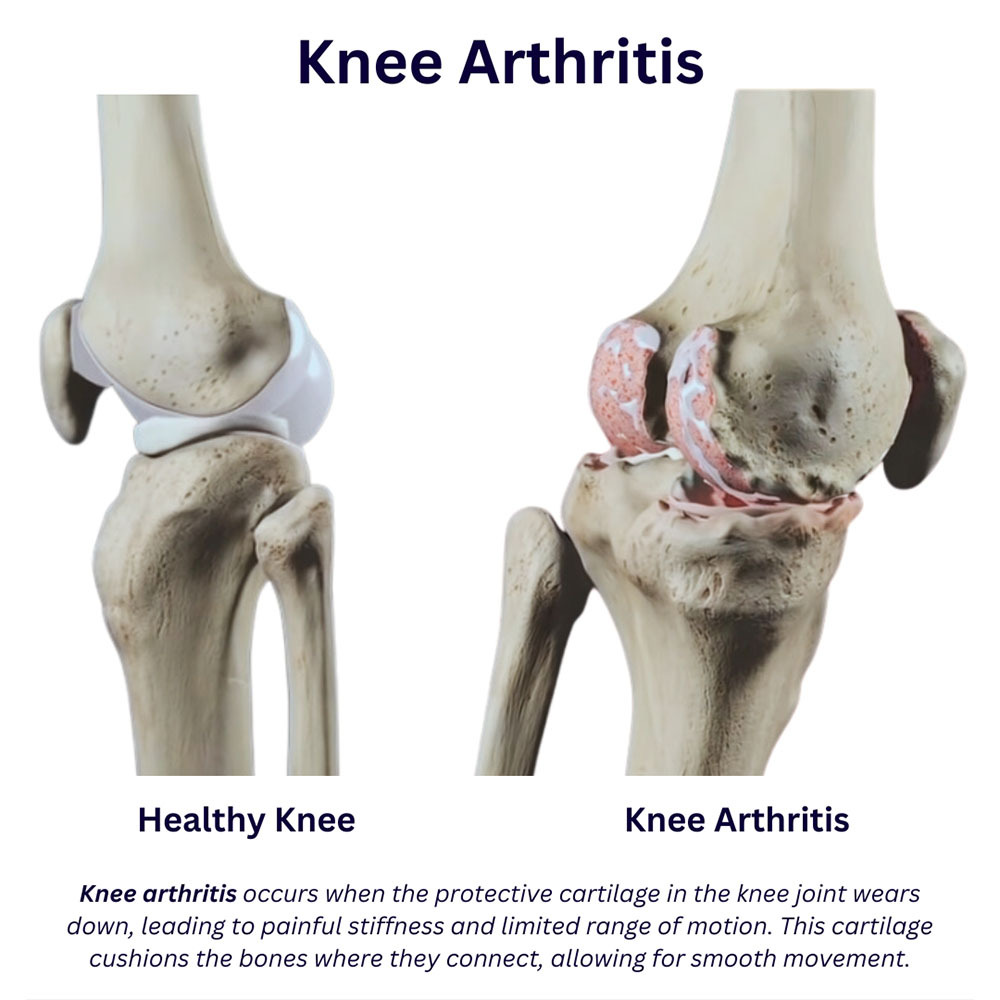
Knee arthritis is a potentially painful, limiting condition that restricts your daily active lifestyle. Instead of opting for knee replacement surgery, you can look for other, non-surgical options, such as knee embolization. This minimally invasive procedure is available at Astra Vein & Fibroid Treatment Center in Brooklyn, NY. Dr. George Bolotin, a top-rated vein specialist in Brooklyn, offers this treatment for those with moderate to severe pain from knee arthritis. Call today to see if you qualify.
Knee arthritis occurs when the protective cartilage in your knee joint wears down, which causes painful stiffness and range-of-motion limitations. The cartilage in the joint is a thin coating at the end of the bones that cushions the area where the bones connect, allowing smooth movement and normal functioning of your knee.
Three bones come together to form your knee joint:
When you develop arthritis, it’s a sign that the cartilage is breaking down. This condition leads to friction between the bones.
The main types of knee arthritis include:
If you’re considering knee replacement because of knee arthritis, learn what doctors wish you knew before knee replacement surgery. Alternatives like knee embolization may help you avoid surgery. Astra Vein & Fibroid Treatment Center in Brooklyn provides a non-surgical solution to knee arthritis that targets pain at the source. With years of specialized experience in minimally invasive treatments, Dr. George Bolotin has helped countless patients find relief from pain.

Pain and swelling are common symptoms of knee arthritis. If you’re suffering from this condition, you may recognize that the symptoms have developed gradually, although it’s possible for the pain to appear suddenly and worsen over time if left untreated.
Some other symptoms of knee arthritis include:
If your knee arthritis symptoms worsen, your mobility and comfort degrade. Chronic pain and movement limitations can potentially impact your mood and even contribute to ongoing frustration. Before these symptoms reach that point, consult your vein doctor in Brooklyn. In fact, visit Dr. Bolotin when you first notice knee pain and suspect arthritis, since the earlier you treat it, the more effective the treatment.
Knee arthritis can be caused by a mix of natural factors, like aging and genetics, but your lifestyle choices may increase your risk of knee arthritis. The cartilage on your knee joints naturally wears out over years of use or abuse. Your body’s ability to repair knee tissues also decreases with age, making your knee joints more prone to damage.
If arthritis runs in your family, you may have an increased risk of knee osteoarthritis. Even with a family history, however, the condition may never get bad enough to notice without something like an injury or illness to set it off.
Other causal factors include:
Your doctor takes a detailed medical history and checks for swelling, tenderness and range of motion limitations. Imaging tests can show cartilage loss, bone spurs and joint space narrowing. If your doctor suspects arthritis, you may need blood tests to check for specific antibodies and inflammation markers. Only after a definitive diagnosis is reached can you receive proper treatment.
If you have knee arthritis, a variety of treatment options can help you feel better, improve your mobility and slow the rate of joint damage. Medications, physical therapy and weight management can help you manage your knee arthritis. Supportive devices — such as braces, canes and orthotics — may relieve your discomfort and improve the function of your joints. These remedies focus on relieving pain, improving flexibility and strengthening the knee joint.
Embolization, on the other hand, works by decreasing the amount of blood flowing into the particular area of your knee that’s become inflamed. Using imaging guidance, your radiologist at the Brooklyn vein center deposits tiny particles into certain blood vessels surrounding your knee joint to partially block blood flow to these inflamed tissues. This reduces the inflammation and pain.
You’re a good candidate for knee embolization if you’re:
Knee embolization is a promising option for you if you don’t want surgery or if other treatments haven’t relieved the condition. You can achieve effective pain relief with fewer risks than traditional knee surgery.
Other benefits include:
If you’re wondering when you should get a knee replacement because of arthritis, consider non-surgical options first. In Brooklyn, Dr. Bolotin, a leading vein specialist and vascular expert, provides care for those looking to avoid surgery, relieve pain and return to an active lifestyle. Contact Astra Vein & Fibroid Treatment Center today.
Vein & Vascular Medical Care
4209 Ave U, Suite A.
Brooklyn, NY 11234
(347) 934-9068
Vein & Vascular Medical Care
869 E Tremont Ave
Bronx, NY 10460
(929) 447-4563